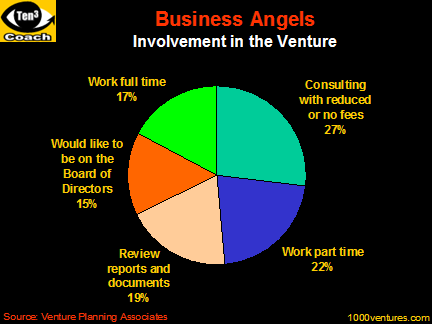
|
Private Investor Behavior |
-
Angels will provide equity plus loan guarantees.
-
Angels usually invest with 2-3 others.
-
Angels bring more than money to the table, often filling gaps in management
skills.
-
Angels usually do not want control.
-
Angels request voting common stock or partnership interests.
-
Angels are looking to exit their investment in 3 – 4 years.
|
|
Private Investor Involvement
Will private investors want to be involved in your business? |
-
21.7% will work part time in the business as employees.
-
27.0% will offer consulting help, sometimes with reduced or no fees.
-
15.1% will agree or ask to be on the Board of Directors.
-
19.0% will review reports and other documents.
-
17.3% will want to work full time for the business.
|
|
It's easy to assume that the majority of
entrepreneurs obtain funding from
venture capital firms. In fact, nearly 80% of
all investment in small startup companies comes from two groups:
-
FFA (Family, Friends, and Associates), and
-
Angels (Private Investors).
While it may be possible to raise money from family and friends, it is not
always the best idea. Often, the FFA funding source is less sophisticated than
an experienced investor, and may have unrealistic expectations. If at all
possible, use FFA funds as
debt,
or preferred, non-voting stock. This will help isolate this group and make it
easier to raise capital for subsequent stages of development later from
'professional' investors.
Investment Evaluation Criteria
Private investors are as diverse as entrepreneurs. There is a wide range of
profiles in terms of their industry expertise, business experience and, most
importantly, their ability to work effectively with you. Successful angels make
their investment decisions based on four fundamental criteria: management,
market, products, and financial opportunity. They evaluate each criterion from
the perspective of minimizing their risk and maximizing their return.
Where To Find Angels
Here are the profiles generally attributed to Angels:
-
Most are entrepreneurs themselves.
-
Generally middle aged; 47+ looking for diversification.
-
Have high incomes, but are not necessarily millionaires.
-
Most are highly educated with advanced technical degrees, M.S. or Ph.D.
-
They are very active investors averaging 3-4 deals per year.
These individuals can be reached through numerous sources. They attend trade
shows, venture capital type meetings, and visit universities to find deals.
Finding them is a matter of personal networking. Many will remain hidden from
the individual
entrepreneur, so using an intermediary is often the only way to meet them.
Examples of intermediaries:
-
'Gate Keepers', who screen projects for wealthy investors, and usually
represent three to five individuals, a trust, family investment pool, or a
group of medical professionals.
-
Business Development Consultants who work specifically with startup,
business development,
mergers
and acquisitions.
-
Bankers, finance companies and savings or investment houses such as stock
brokerages.
-
CPA's, tax, accounting and bookkeeping companies.
-
Attorneys, bankruptcy courts, and arbitration groups.
|